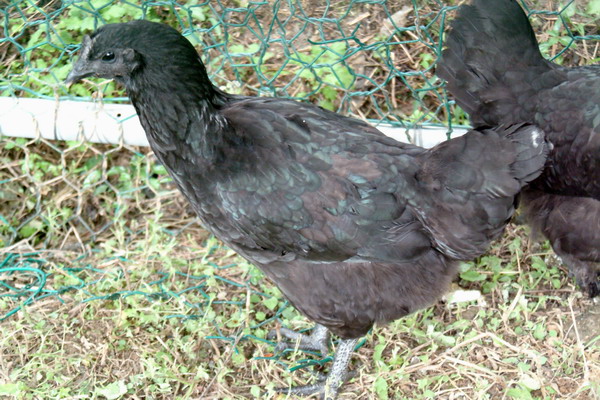|
| 질의: Korean black chicken | 결과: 1번째/10 | |
Korean Black Chicken (Ogol Chicken) (오골계)
| 제목: | Korean Black Chicken (Ogol Chicken) (오골계)
| | 올린이: | Jinsuk Kim (kusnij@naver.com)
| |

| 해상도: 600x400
파일크기: 132474 Bytes
촬영일: 2005:09:18 15:35:59
사진기: FinePixS2Pro (FUJIFILM)
F number: f/3.2
Exposure: 10/450 sec
Focal Length: 3500/100
등록시간: 2005:10:08 03:55:56
|
Sancheong, Kyeongsangnamdo, South Korea
Ogol means "black bone" in Korean. This breed's feather, meat, and bones are black in color.
Korean Native Ogol Chicken, Korean Black Chicken, Ogol Fowl
"Several poultry farms in Korea are raising Korean Native Chickens, or the Ogol Fowl. The Korean Native Chicken is believed to have been raised for almost 2,000 years. It is not easy to find pure lines, because most disappeared during World War II and the Korean War. The remainder were crossed with imported breeds. Recently, many researchers have tried to find the specific characters of this breed. The Ogol chicken is bred, not for quantity, but for quality. The native chicken grows very slowly and its egg production is poor. The price of its meat is almost five times higher than that of ordinary broilers. The Korean native chicken was not bred for meat purposes, but is adapted to backyard raising. The boom to raise this breed started after consumers began to look for good quality chicken meat.
The average body weight of the Korean Native Chicken at 14 weeks of age is 867.7g. The eviscerated carcass yield at 9-14 weeks is 74.1-78.5% for males and 73.9-77.5% for females.
In terms of body chemical composition at 14 weeks, the crude protein of Korean native chickens was 25.03-26.36% in the breast and 21.65-21.85% in the thigh, which is a little higher than the crude protein content of broilers.
The Korea Ogol fowl typically has black feathers, beak, comb, legs, bone, skin, and meat. The meat is often eaten as a folk remedy, to improve people's health. Although the meat of this breed fetches a very good price, it is not yet very popular. However, raising these two native breeds might be suitable for farmers who have only a small land area and limited resources." - Source: Ministry of Agriculture, Forestry and Fisheries 1992
|
댓글 |
|---|
| | 손님 |
|
| Very interested in your Ogol fowl. In your article it is said that it is used as folk medicine. What exactly is it good for? As I live in London and I'm very keen to get hold of the Ogol fowl for cooking, can you tell me whether they are being exported to the UK, and if so where can I find them? |
| | 손님 |
|
| im, interested of ur black chiken bcoz of my bos mr. misha shen he want to import of that chiken but elegal how can |
^o^
동물그림창고 똑똑전화 누리집
^o^
|
|
|

